Youssef Chahine
(b. 1926)
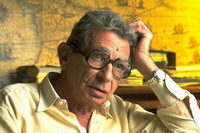
Youssef Chahine
(b. 1926)
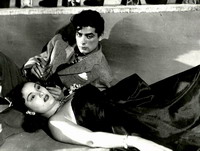
Shukri Sarhan in Nile Boy
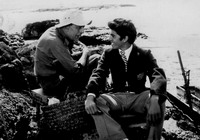
Alexandria… Why?
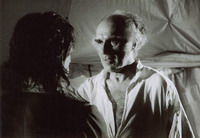
Michelle Piccoli
in Adieu Bonaparte
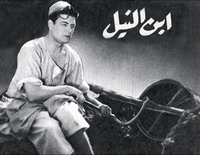
Dalida
in The Sixth Day
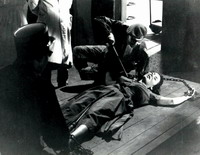
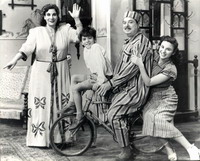
Marie Munib, Hussein Riad and Faten Hamama in Daddy Amin

Poster of Alexandria… Why?
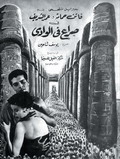
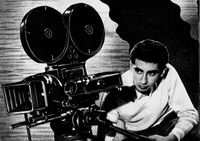
Youssef Chahine behind camera
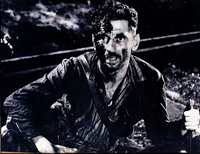
Youssef Chahine in Cairo Station
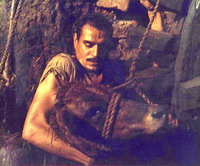
Ezzat el Alayli in The Land
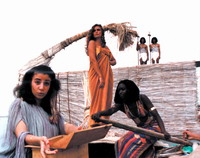
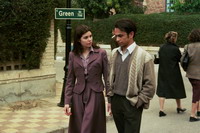
Alexandria…NewYork
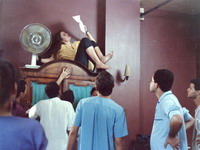
Alexandria Again and Forever
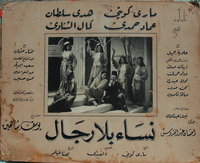
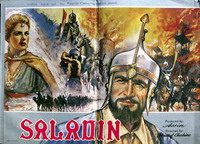
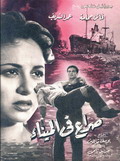
Dark Waters
Youssef Chahine, one of the most outstanding directors of Egyptian cinema, is credited with introducing Egyptian Cinema to the world; he has managed to make the local transcend national borders and reach out to people from all over the world, not only because of his perceptive rendering of his subject matter and his innovative technique but also because of his early cosmopolitan experience in Alexandria.
Chahine was born on 25 January 1926 in Alexandria. He began his education at a French Missionary school, and then continued his studies at Victoria College, one of the region’s most prestigious schools, counting among its graduates the late King Hussein of Jordan, King Simeon of Bulgaria, Prince Abdulillah of Iraq, actor Omar Sharif, film directors Tewfik Saleh and Shadi Abdel Salam.
The cosmopolitan nature of the school, which basically reflected that of Alexandria at large, played an exceptionally important role in shaping Chahine’s consciousness during the formative years of his life as it fostered his love and tolerance towards all ethnic and religious groups, a theme which was to figure in many of his films, such as Alexandria…Why? (Iskandariyyah lîh), Saladin (El Nâsir Salah Eddine)and many others.
As a young boy, he was so fascinated with cinema, theatre and Hollywood musicals that he dreamt of becoming an actor and dancing like Gene Kelly. This dream never faded away and accompanied him into adulthood for after spending one year at the University of Alexandria, he went to California to study acting at the Pasadena Playhouse to pursue his persistent dream of becoming an actor. Surprisingly enough, when he went to the United States, he decided to study directing instead of acting because he felt that he did not resemble the stars of his time. Guided by the extraordinary stage director Leonore Shanwise and the friendship of Victor Jory and Robert Preston at the prestigious Pasadena Playhouse, he received his diploma in 1948.
On his return to Egypt, he started promoting a script he had written entitled Son of the Nile (Ibn el nîl) but was turned down by all the producers he approached.
He thus worked as an assistant director to the Italian documentarist Gianni Vernuccio, and then assisted the Italian cinematographer Alvise Orfanelli who was the one who really helped Chahine into the film business by introducing him to Zeyad Film Production Company in 1950.
The company agreed to hire Chahine, encouraged by his meagre salary, but did not agree to his script. Chahine, therefore, proposed another idea. The company agreed to the new idea but out of mistrust for the twenty-three year old youth, they entrusted Hussein Helmi with writing the scenario and Ali el Zorkani with the dialogues of Daddy Amin (Bâbâ amîn), Chahine’s first film. Despite his young age, Chahine not only managed to accomplish the film beautifully but also displayed an outstanding ability to lead experienced actors like Hussein Riad and Mary Mounib. After the success of Daddy Amin (Bâbâ amîn), producers were now willing to produce his first creation Son of the Nile (Ibn el nîl) in 1951.
The film relates the story of a villager’s dream of immigrating to the city as he is dissatisfied with the narrow range of experience open to him at the village. Despite the film’s simplistic view of the village/city dichotomy, it could still be interpreted on many levels. The villager’s dream in this film could be said to stand for the dream to immigrate to the United States, the Promised Land of many youths at that time, including Chahine himself. In fact, Chahine does pick up this parallel later in Alexandria…Why? (Iskandariyyah lîh) when Yehia, Chahine’s mouthpiece in this autobiographical film, constantly gazes at the ships that dock at the harbour of Alexandria and dreams of sailing on board one of them to the land of fortune, glory and opportunity but comes to see a completely different reality on arriving at the States.
In 1952, he was to return once again to the city with its bourgeois class in The Great Clown (El mouharrig el kabîr) and The Lady of the Train (Sayyidet el qitâr) respectively. It is clear from these social films that till that time Chahine had not formulated a solid political stand and thus only tapped into social issues, with an occasional dabbling in politics. Chahine says in this respect:
Undoubtedly, the defeat of 1967 contributed strongly to my awareness of the artist’s responsibility toward society. Yet, to be honest, already after the revolution in 1952 I became aware of that responsibility – though in an abstract and diffuse way – when I found myself given a choice between participating in the events of reality that surround me or being content to observe them. This was maybe expressed in The Blazing Sun (Sirâ‘ fîl wâdî). After June 5 I started changing: first I moved from bourgeois entertaining cinema by addressing certain topics within that cinema and started then to make films that correspond to society’s needs. You have to produce films that are indispensable. (Farid, 1971, p. 20)
Chahine, who is credited with discovering Omar Sharif, gave this international star his first role in 1954 in The Blazing Sun (Sirâ‘ fîl wâdî). He was to give him another role in the very same year in The Demon of the Desert (Chytân el sahrâ’), a film which he eventually disclaimed as he did not see it to completion.
In Cairo Station (Bâb el hadîd) (1958), one of Chahine’s best films, he chooses to bring to the foreground the suppressed narrative of a marginalized sector of society by presenting the tragedy of Qenawi, a sexually frustrated crippled young man who works at Cairo Central Station. It was many years later that the film came to be appreciated and counted among the classics of Egyptian cinema.
In 1958, Chahine was to direct another important film in his history, Jamila the Algerian (Gamîlah), hence proving that he is not only the first Arab director to practically react to the struggle of the Algerian people and relate it to that of the Arab world, which suffered from the yoke of imperialism, but that he is also the first Arab director to hail the patriotism of an Arab woman and stress her positive participation in her country’s affairs; Jamila, the heroine of the film, actively takes part in resisting the French and is consequently captured, savagely tortured, unfairly tried and sentenced to death.
In 1963, Chahine directed Saladin (El Nâsir Salah Eddine), one of the greatest historical films in the history of Egyptian cinema, with the ultimate aim of refuting the negative Western prejudices and misconceptions regarding Islam and Islamic culture by casting light on the heroism of Saladin, the twelfth-century Syrian sultan who liberated Jerusalem from the Crusaders.
Both the content of the film and its technical achievement are to be applauded for Chahine managed to shoot eight large-scale battles and creatively made use of costumes, décor, light, colour, movement of camera and theatrical scenes to enhance the film’s visual aspect with a total budget of one hundred and twenty thousand Egyptian pounds, a huge budget for Egyptian films then but a slim one if compared to similar American films of the time. Chahine accepted this challenge to prove that lack of facilities cannot hamper enthusiastic film-makers from achieving their dreams. Many factors seemed to have worked equally for the benefit of the film, for the acknowledged writers Naguib Mahfouz, Abdel Rahman el Sharkaqawi and Youssef el Sibai contributed to the screenplay, and the exceptionally talented set designers Shadi Abdel Salam and Wali Eldin Samih created the costumes and set of the film.
Like many Egyptian intellectuals and artists, Chahine was shocked after the defeat of 1967 which sent reverberating waves throughout the Egyptian society. He now attempted a deep and perceptive understanding of the defeat and its causes in four consecutive films: The Land (El ’Ard) in 1970, The Choice (El Ikhtiyâr) in 1971, The Sparrow (El ‘Osfour)in 1974, and The Return of the Prodigal Son (‘Awdat el-ibn el dâll) in 1976.
The Sparrow (El ‘Osfour) was banned in May 1973, then received in December of the same year the country’s highest cultural award. More importantly, however, is that starting from The Sparrow (El ‘Osfour), Chahine departed from the conventional mainstream cinema of his time and developed his own individual style, hence emerging as a pioneer in this respect; instead of using a linear plot, he displayed a new liking for fragmented forms, discontinuous narratives, and random-seeming collages of disparate material such as flashbacks, actual events, associations and documentary sequences. The overall result of these shifts was the inception of a new phase in his films which was dedicated to experimentation and innovation.
After suffering from a serious heart attack in his early fifties, Chahine had a major open heart surgery in London. This experience initiated a new phase in his life for it made him reflect on his past, and evaluate his achievement and choices. The result was that Chahine embarked on a quest for self-knowledge which found expression in Alexandria…Why? (Iskandariyyah lîh) in 1978, the first film in what would prove to be an autobiographic quartet, completed with An Egyptian Story (Haddoutah masriyyah) in 1982, Alexandria Again and Forever (Iskandariyyah Kamân we Kamân) in 1990, and Alexandria…New York (Iskandariyyah…NewYork) in 2004. Alexandria, the city of Chahine’s childhood and early youth, is central in these films for it is not just a mute background or location but a lively and vivid place that leaves a strong inerasable imprint on the lives and fortunes of all its inhabitants. In fact, it could be argued that Alexandria.. Why? (1978), An Egyptian Story (1982), Alexandria Again and Forever (1990), and Alexandria...New York (2004) are not Chahine’s autobiographical quartet but rather Alexandria’s quartet.
In 1985, Chahine managed to raise a fund from French institutions to produce his grand spectacle Adieu Bonaparte (Wada‘n Bonaparte), starring the French stars Michel Piccoli and Patrice Chéreau. In this film, Chahine attempted a perceptive exploration of the nature of the relationship between the colonizer and the colonized in light of Bonaparte’s expedition to Egypt in 1798.
Chahine was to venture into another daring experience when he chose the famous singer Dalida to play the role of a poor Egyptian woman in The Sixth Day (El Yawm el Sâdis) in 1986. The film is an adaptation of a novel written in French by the Lebanese writer André Chedid.
In the same year, he started writing The Emigrant (El Mouhâguir), a story inspired by the Biblical character of Joseph, son of Jacob. The film, however, created controversy in Egypt between the enlightened wing and the conservatives who opposed the depiction of religious characters in films.
In Destiny (El Massîr) in 1997, Chahine used the life and achievements of Averroes (Ibn Rushd) to project onto it the conflicts and tensions of the present. In 1999, his film The Other (El âkhar) which dealt with terrorism, globalization, corruption and American hegemony, was selected for the opening of Un Certain Regard section at Cannes International Film Festival. Similarly, Alexandria...New York (Iskandariyyah…NewYork) in 2004 was selected for the opening of “Un Certain Regard” section at Cannes International Film Festival. In 2001, he directed his musical Silence… We’re rolling (Sokout.. ha nesawar), which received special distinction by the Venice festival committee. There again, he dared cast Tunisian singer Latifa in the leading role, although she had no acting experience prior this film.
Like many directors of his time, Chahine found difficulty in realizing his plans as no producer was willing to finance his films and as he was not willing to give in to the demands of the producers. To find an outlet, Chahine established his own private production company (Misr International) with other members of his family and sought foreign co-productions to help finance his projects. His first co-productions were with the former ONCIC in Algeria for The Sparrow (El ‘Osfour) in 1974 and The Return of the Prodigal Son (‘Awdat el-ibn el dâll) in 1976 and later with the French ministry of Culture and French Television for his more expensive projects, such as Adieu Bonaparte! (Wada‘n Bonaparte) in 1985, Alexandria Again and Forever (Iskandariyyah Kamân we Kamân) in 1990, The Emigrant (El Mouhâguir) in 1994, and Destiny (El Massîr) in 1997.
He has deservedly won a number of prestigious awards among which are the Golden Tanit at the Carthage Film Festival for The Choice (El Ikhtiyâr) in 1970, the Berlin Grand Jury Prize for Alexandria.. Why? (Iskandariyyah lîh) in 1978 and a Lifetime Achievement Award on the occasion of the 50th anniversary of the Cannes Film Festival in 1997. He has also been awarded 3 doctorates: the first from Paris VIII University in 1997, the second from the American University in Cairo in 2002, and the third from Marseille Summer University in 2002. He has been decorated 12 times with the order of Commander of the Arts and Letters by Egypt, Tunisia, Lebanon, and France. Moreover, a major highway in Zahlé in Lebanon is named after him.
The first Arab director to react practically to the struggle of the Algerian people and relate it to that of the Arab world, and the first Arab director to hail the patriotism of an Arab woman.
Filmography:
A film made by Youssef Chahine when he was a student at Victoria College in Alexandria.
| School Life 1944 |
1944: School Life A film made by Youssef Chahine when he was a student in Victoria College in Alexandria.
1950: Daddy Amin (Bâbâ amîn)
1951: Son of the Nile (Ibn el nîl)
1952: The Great Clown (El mouharrig el kabîr)
1952: The Lady of the Train (Sayyidet el qitâr)
1953: Only Women (Nisâ bilâ rigâl)
1954: The Blazing Sun (Sirâ‘ fî-l-wâdî)
1954: The Demon of the Desert (Chytân el sahrâ’)
1956: Dark Waters (Sirâ‘ fî-l-mînâ’)
1957: Farewell my Love (Wadda‘tou houbbak)
1957: My One and Only Love (Anta habîbî)
1958: Cairo Station (Bâb el hadîd)
| 1958: Cairo Station (Bâb el hadîd) |
1958: Jamila the Algerian (Gamîlah)
1959: Forever Yours (Houb ilâ el-abad)
1960: Only You (Bein îdek)
1961: Lovers’ Complaint (Nidâ el ‘ouchâq)
1961: A Man in my Life (Ragol fî hayâtî)
1963: Saladin (El Nâsir Salah Eddine)
1964: Dawn of a New Day (Fagr Yawm gadîd)
1965: The Ring Seller (Bayaa el Khawatem)
1966: Golden Sands (Rimâl min Dahab)
1968: Once upon a time … the Nile (El Nîl wa-l-haya)
1969: The Land (El ’Ard)
1970: The Choice (El Ikhtiyâr)
1973: The Sparrow (El ‘Osfour)
1976: Return of the Prodigal Son (‘Awdat el-ibn el dâll)
1978: Alexandria, Why? (Iskandariyyah lîh)
1982: An Egyptian Story (Haddoutah masriyyah)
1984: Adieu Bonaparte (Wada‘n Bonaparte)
1986: The Sixth Day (El Yawm el Sâdis)
1989: Alexandria Again and Forever (Iskandariyyah Kamân we Kamân)
| 1989: Alexandria Again & Forever (Iskandariyyah Kamân we Kamân) |
1994: The Emigrant (El Mouhâguir)
1997: Destiny (El Massîr)
1998: It’s Only One Step (Kolaha Khatwah)
1999: The Other (El âkhar)
2001: Silence.. We're rolling (Sokout.. ha nesawar)
2002: 11’09’01’ (In collaboration with eleven directors)
2004: Alexandria…NewYork (Iskandariyyah…NewYork)
Forthcoming: What a Mess! (Heya fâwda)
Documentaries:
1967: The Sacred Oil (Documentary)
1972: Salwa the Girl who Talked to Cows (Unicef-documentary)
1974: Forward We Go (Intilak) (Documentary)
1991: Cairo... as told by Chahine (Documentary)
Plays:
1947: Ibsen’s Love Comedy
1948: The Magnificent Vanes
1993: Caligula (Comédie Française)
References:
- Armes, Roy. Third World Filmmaking and the West. Berkeley, 1987.
- Farid, Samir. Adwa‘a ‘ala Cinema Yusuf Shahin. Cairo: El Hay’ah el ‘Amah lel Ketâb, 1991.
- ____. ____. "Hadith ma‛a Yusuf Shahin". Cairo: Nashrat Nadi el Cinema, 1971, 20.
- ____. ____. Howar el Sharq wa el Gharb: El Intâg el Misrî el Ourobî el Moushtarak.Alexandria: Bibliotheca Alexandrina, 2004.
- Hisham, Salah. El Cinema el ‘Arabiyah Kharig el Hodoud. Cairo: El Markaz el Qaumi lel Cinema.
- Shafik, Viola. Arab Cinema: History and Cultural Identity. Cairo: AUC Press, 1998.
- Shawki, Souad. Cinema Yusuf Shahin. Cairo: Afâq el Cinema, 2004.
- Shemayt, Walid. Yusuf Shahin hayah lel Cinema. Beirut, Riyad el Rayyes lel Kotb wa el Nasher, 2001.

